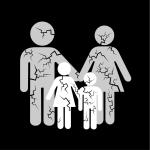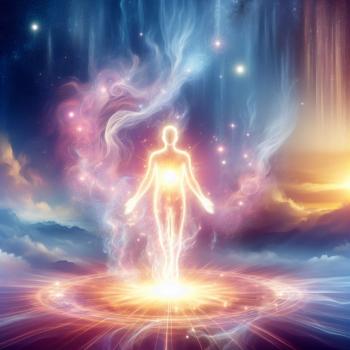As we enter into Easter week, my exhortation to all who read these words is very simple: choose life over death. We live in a culture that easily embraces all things destructive, and a society that celebrates defacing the image of God in man instead of recognizing and accepting it. And so we must resist what is evil and be intentional about choosing the Good.
However, to do this, we must first discern what is evil. If we do not know evil, how we can resist it? If we do not know Good, how can we turn to it? But how can we know health from unhealth, good from evil, life from death in a culture that dismisses the very idea that words have meaning? Or, even more sinister, that practices a form of “double-speak,” an idea one of the more prescient minds of the past century warned us about. “Double-speak” being saying one thing while meaning its opposite: “war is peace,” “tolerance is oppression,” “the creature is the Creator.”
An Appeal to What Has Been Given
We are all born with a body. That body is given to us, we did not make it ourselves. First, our body was given to us by God, Who created all material existence. But, not only did God create the material out of which we are made, He also providentially determined how that material would exist. He determined in what mode or form our body would exist. Second, our body is created through our parents. Our parents donated (in better or worse ways) parts of themselves, their genetic material, to “pro” create us.
For better or worse then, none of us had any choice in this matter. We did not choose to be born. We did not choose the timing of our birth. We did not choose any of the original features we were born with (e.g., our actual and potential height, our skin color, our hair texture, our eye color, etc.) Moreover, we did not choose how our bodies would be curated, cultivated and cared for by those closest to us, or society in general. We did not choose to be born into 21st-century America, just as Spartacus did not choose to be born into 1st-century BC Rome.
There are other aspects of our bodies we clearly did not choose. Nevertheless, this is what has been chosen for us. This is what has been given us. We all share this one thing, at least: that we were born with the bodies we have, and we had no choice in the matter. However, the Bible suggests that the bodies we have were known to God. They were known by God long before we were born (Jeremiah 1:5, Psalm 139:15-16). Philosophically speaking, we could argue that God knows the essence, or form, of every person who will ever exist, as well as, every person that could possibly exist. This is logically compatible with God’s divine omniscience.
If God exists and is omniscient, then He knew you would be born. He knew you would be born a man or a woman. He knew what ethnicity or racial group you would be born into, and in what geographical location you would be birthed. And so on, and so forth. In knowing these things, God did not directly determine them, knowing and causing being distinct acts. However, God did allow these features about you to happen in the way they did. He permitted free creatures, your and my parents, to act in such a way that you and I were brought about to exist. This was all done in a particular and particularly unique way.
And so we all have been given a body. It is not a body of our choosing. In a sense, then, while it is our body and not someone else’s, in not being created by us, we don’t necessarily have full ownership over it. Being created first by God, then by our human parents, our bodies could be seen either as a gift given, or a burden imposed. Either way, however, we must look to our creators to know more about that gift, or burden, and what to do with it and how to use it. This is the givenness of our bodies. Since we did not create our bodies, we do not have what some have called per caussas knowledge.
Per caussas knowledge is the type of knowledge we have if we are the maker of something. The kind of knowledge a master craftsman has of the tools he makes, or an architect-engineer duo has of the building they design and construct. Isaiah Berlin, discussing the philosophy of Giambattista Vico, describes this type of knowledge:
The view that knowledge per caussas is superior to any other is an old idea….according to this principle we can be said fully to know a thing if, and only if, we know why it is as it is, or how it came to be, or was made to be, what it is, and not merely that it is what it is, and has the attributes it has….Thus God knows the world because he has made it in ways and for reasons which he alone knows; and we cannot know it in that full sense, because we have not made it–because we find it ‘ready made’–it is given to use as a ‘brute fact.’
Isaiah Berlin, Three Critics of the Enlightenment, 39-40
While there are problems with limiting knowledge claims to per caussas, there is truth in the per caussas claim. For when we create something ourselves, knowing the intention of our creative act, and the end goal (or final cause) of the thing we created, then we know that thing better than something we did not make. Unfortunately, we don’t know ourselves in this way. We are “a given,” a ready made brute fact that needs to look elsewhere for knowledge about ourselves, and our bodies.
To Accept or Reject That Which Has Been Given
Of course, I have snuck something into this essay. There is an implication about human persons that I should make explicit. Until now I have said “we” possess or have a body. That assumes there is some other thing, you and I, that has a body or that is embodied, but that is not itself a body. In metaphysics this is called the “substantive self.”
Some people reject the idea that there is such a “self.” But, for sake of argument, I am presupposing something like a human soul or mind. The soul or mind is the other aspect of the human person, the more fundamental one actually. It is the aspect of the person that does the thinking, the feeling, and the choosing that subsequently motivates and moves the body to act. In modernity this is a controversial claim. However, only in modernity is it controversial. It is the common sense view of most cultures, and most people, throughout history. I’ll stick with that common sense view, as almost everyone does in real life. If you find this problematic, next time you are keeling over with nausea after eating some bad sushi, just ask yourself if it is “you” that is vomiting or not.
So there is something, “me” and “you” that has a given body. You are living in it, or with it, or through it, right now. You have agency over it. You can control your body, or, at least, parts of it. However, there are parts of your body that you may not appreciate. I would suggest that most people, maybe all people, dislike something about the body they have been given. There is something wrong with them, after all. They don’t always look the way we might like (perhaps more of a problem in a culture where we see our own image on a regular basis). And, of course, they don’t always function they way we might want. So, what are we to do about that? Especially if the Bible tells us that God a) knew the form and manner of our bodily existence from all time, and b) God allowed for it to happen this way, and not some other way?
On the one hand, we could accept that which has been given bodily, in spite of its deficiencies or our dislikes. Alternatively, we could reject it, on account of those same deficiencies or dislikes. However, this raises the initial question I posed at the outset of the essay: how do we know what is and is not a deficiency of our body? Moreover, if there are things that are legitimate deficiencies, things we recognize as being truly detrimental, can we voluntarily act to improve them? Or must we accept them without any voluntary intervention to try to correct them? Second, are there other things that are not really deficiencies, but only “perceived” deficiencies, i.e., only dislikes? And, if only perceived dislikes, should they to be addressed in the same manner?
An Appeal To Proper Function
“If it ain’t broke, don’t fix it,” is a common sense maxim. Why would we try to fix something if we can see it isn’t broken? What would be the point? When we look at our bodies we know there are many parts of it that seem to function properly. If our circulatory system is pumping blood, it is doing its job. If our respiratory system is properly exchanging gases, allowing us to inhale and exhale, then we wouldn’t try to fix it. We can try to enhance or maintain these systems, perhaps by doing exercises or eating the right foods. But we wouldn’t try to fundamentally change them, we would only try to make them work in the same way but even better. Of course, if we realized at some point that they were not working as well as they could, or had loss some function, we might try to intervene to repair them. But, we would first detect something about them that was not working properly.
In short, if our bodies were functioning properly, we would not change them. At most, we would enhance what has been given, making them through our own efforts stronger, more efficient. But, we wouldn’t think to alter them completely, or change their form entirely. That would be irrational. But, if we accept the given of these bodily systems, like the respiratory or circulatory systems, why would we not accept the given of all our bodily systems. Why would we disregard some, like say the reproductive systems, as less important or less significant than our respiratory or circulatory systems? Obviously, in one sense, there are systems more vital to life than others. But, the point is about proper functions. If organic systems are properly functioning, why would we mess with them?
I suppose it would be possible for someone to hate their heart or their lungs. If one did, I suppose they could take out their anger toward those systems by committing suicide. But we would think it odd that someone would end their life because they hate their aorta, or their trachea. Usually one does not hate their organs. If they did, we would think normally that the problem is not in the properly functioning organ, but in the mind of the one who possesses that organ. Somehow the mind is misperceiving its own body, seeing it as bad as opposed to good.
For most of history, this is what human beings have thought: that hatred of the body is, in some sense, a problem of the mind or soul. The body was fine, albeit not perfect, and it was the mind that needed realignment. One strand of an early Christian heresy, the gnostic heresy, thought just that, that bodies themselves were evil, or insignificant. The orthodox Church corrected this error, because it was an error of the mind– a distortion of that which had been given by God.
Lovers Of Death versus The Giver of Life
There are many today, to include many who call themselves “Christian,” who advocate for destroying bodies. They want to enable people, even young people, to desecrate the givenness of their bodies through medical surgeries and drugs. They think, I guess, that someone who doesn’t like their body might feel happier after doing so. However, in this calculation is the idea that destroying that which is perfectly healthy, like a healthy set of female breasts, a perfectly functioning penis or set of testes, or an entirely normal uterus, is life-giving. And here we see the “double-speak” that Orwell warned us about: “death is life-giving,” “destruction is health,” and “sex-denial is gender affirming.”
Of course, the deeper rebellion here is against the creators of the body that is being deconstructed. It is rebellion against both one’s parents (unfortunately, often where the confusion about one’s body comes from, too often through abuse) and it is rebellion against God, the ultimate Giver of bodies. So, those who encourage people to intentionally destroy or manhandle their own bodies, are also encouraging the same people to rebel against their parents and against God. It is these “enablers” that will have the greater portion of God’s wrath, as they lead others into destruction. They are not unlike the friend of the alcoholic who takes his buddy to the bar and even picks up the tab. For such cruel people, Jesus has only the strongest words:
5 “Whoever receives one such child in my name receives me, 6 but whoever causes one of these little ones who believe in me to sin,it would be better for him to have a great millstone fastened around his neck and to be drowned in the depth of the sea.7 “Woe to the world for temptations to sin! For it is necessary that temptations come, but woe to the one by whom the temptation comes!
Matthew 18:5-7
Jesus Christ does not have words of comfort or “affirmation” for those who tempt others to destroy themselves. Those who tempt, especially the young, to torture the bodies God has given them will find themselves with a very heavy burden tied around their neck. These are lovers of death, seekers of destruction, and their name is Legion. However, they come to us in the form of friends. They present themselves as defenders of the marginalized. However, they are anything but defenders, they are aggressors. They are the one’s who truly hate. Most of them go by the label “Progressive,” although none of them are really about progress. They are all about regression, and their idol is death, not life. We must not listen to them. We must listen instead to the One Who gives Life, to the Giver of Life Who is also the Giver of our bodies.
Choosing Resurrection Life over The Culture of Death
This Easter, I encourage everyone who reads these words to chose life over death. However, there is one thing that the lovers of death do get right, although they confuse it. There is a “death” that needs to take place in order for us to have true life. However, it is not the death or mutilation of our bodies. It is the death of our “substantive selves.” It is the deconstruction of our ego. The death that must occur is the death of the “I.” We must die to our substantive self, or the volitional part of it, if we are to be born again and have new life. We must die to our own will, if we are to be alive as a true self. Bonhoeffer said it this way, “When Christ calls a man, he bids him come and die.”
There have only been two types of people throughout history: those who affirm their own will, and those who die to their own will and place it in the service of the Divine Will. The first group has its famous names: Gorgias, Lucretius, Epicurus, Machiavelli, Hume, de Sade, Nietzsche, Marx, Hitler, Mao, Sartre. Their father is the great and cowardly advocate of the total affirmation of the will: Satan. Anyone today who advocates for the right of people to “affirm” their own gender follows in their footsteps. That includes so-called “Christians,” who are “gender affirming.” For these, the human will is over all, and there is no exception to that rule. They love to see the image of God in man disgraced.
The latter group, however, also has its men and women of fame. They are Abraham, Moses, Socrates, Plato, Confucius, Paul, Augustine, Aquinas, Johnson, Dostoyevsky, Day, Lewis and Theresa. These are the ones who knew the Christ, the Giver of Life, some even in advance of His incarnation. In knowing Christ, they knew themselves and, in knowing their true selves, knew how to treat their bodies (yes, even Plato!).
Thus, there are those who in loving the self, choose death, and those who in loving God, choose true life, to include embodied life. Then there are those who say they love God, but are themselves of the devil (Matt 7:15-23). Beware of them, they will tell you about Jesus out of one side of their mouth, then tell you to chop yourself up out of the other. They will say that Jesus created all things, but then tell you that what He gave you was wrong and oppressive. They will even say that Jesus loves you, while at the same time saying that His love can really do nothing for you, that you must not be transformed by His love, but take transformation into your own hands, under the blade of a scalpel. These men and women are deceivers, do not listen to their words. Remember, Jesus was already cut up for you, you do not need to cut yourself.
This Easter, listen to the words of Jesus Himself:
Jesus said to him, “I am the way, and the truth, and the life. No one comes to the Father except through me.
John 14:6
And also, listen to the words of Jesus’ disciple Paul:
For we know that if the tent that is our earthly home is destroyed, we have a building from God, a house not made with hands, eternal in the heavens. 2 For in this tent we groan, longing to put on our heavenly dwelling, 3 if indeed by putting it on we may not be found naked. 4 For while we are still in this tent, we groan, being burdened—not that we would be unclothed, but that we would be further clothed, so that what is mortal may be swallowed up by life. 5 He who has prepared us for this very thing is God, who has given us the Spirit as a guarantee.
2 Cor 5:1-5
You do not need to change your body in order to be transformed. Real transformation–spiritual regeneration–is available today in the presence of your Creator. If you accept this gift, you can keep be rectified with your present body, knowing you have an eternal one waiting for you in heaven with your God and with His people, all of whom really love you.














